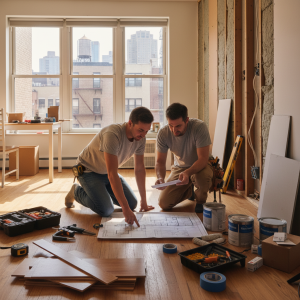Last Updated on October 30, 2025 by teamobn
Many of us dream of owner-building but the demands in our work lives and family commitments mean that it stays just that – a dream. The challenge is that that dream contains the elements and functionality you want in your new home… design features that will make your house your home! If owner-building isn’t viable, one of the best options is to buy a new home ‘off-the-plan’.
Investing in property is a substantial financial commitment, and when buying off the plan, there are extra elements to take into account. The prospect of owning a brand-new, contemporary home before construction even begins can be thrilling, but it’s crucial to approach this decision carefully. Asking the right questions early on will help you gain a clear understanding of what’s involved, allowing you to make a smart, informed choice and safeguard your investment.
In this article, we’ll explore the key questions you need to ask before committing to an off-the-plan purchase. These questions will help you assess the potential risks and benefits, ensuring that you understand what you’re getting into.

Contents
- 1 What Is the Developer’s Track Record?
- 2 What Are the Specific Details of the Development?
- 3 When Will the Property Be Completed?
- 4 How Is the Price Structured?
- 5 What Are the Financing Options?
- 6 What Are the Terms of the Contract?
- 7 Will the Property Appreciate in Value?
- 8 Are There Any Warranties or Guarantees?
- 9 Can You Inspect the Property During Construction?
- 10 Wrapping it up…
What Is the Developer’s Track Record?
Examining the developer’s track record is essential when buying off the plan. Investigate their history with previous projects to assess whether they have consistently delivered high-quality homes within the promised timeframe. Additionally, reading reviews from past buyers can provide valuable insights into their experiences, helping you gauge the developer’s reliability and commitment to meeting expectations.
Questions to Ask:
- Have they completed similar projects before?
- Were there any significant delays or issues with construction?
- What is the overall quality of their past developments?
Choosing a reputable developer can give you more confidence that your project will be completed successfully and on schedule.
What Are the Specific Details of the Development?
It’s important to understand every detail of the project you’re committing to. Buying off the plan means purchasing a property before it’s built, so there’s no physical home to inspect. Ensure that you are clear on what will be delivered when construction is completed.
Questions to Ask:
- What are the design features, including room dimensions and finishes?
- Are there any upgrades or customization options?
- What common areas or amenities will be included in the development?
These details will help you visualize the final product and ensure that it meets your expectations.
When Will the Property Be Completed?
One of the most critical factors is the expected completion date. Construction timelines can often be delayed due to unforeseen circumstances, so it’s essential to have a realistic understanding of when the property will be ready.
Questions to Ask:
- What is the estimated completion date?
- Is there a clause for delayed completion in the contract?
- What compensation (if any) is provided if the project is delayed?
Knowing the timeline will help you plan your finances and move-in date more effectively.
How Is the Price Structured?
Pricing can sometimes differ from purchasing an existing home. Understand how the price is structured and whether there are any additional costs associated with your purchase.
Questions to Ask:
- Is the price fixed, or can it change over time?
- Are there any additional costs, such as stamp duty, legal fees, or maintenance fees?
- Are there incentives, such as discounts or rebates, for early buyers?
It’s also worth considering the property market trends and whether buying off the plan could offer price appreciation by the time construction is completed.
What Are the Financing Options?

Financing a property that is still under construction can differ from purchasing an existing home. Ensure that you understand your financing options, including any specific conditions attached to off-the-plan purchases.
Questions to Ask:
- Can you secure a mortgage before construction is completed?
- Are there penalties if financing falls through before settlement?
- Will your lender accept a valuation based on plans, or will they require a physical inspection before settlement?
Speak to your lender to understand what is required and ensure you are financially prepared for the purchase.
What Are the Terms of the Contract?
The contract is often more complex than purchasing an existing property. Ensure that you fully understand the terms of the contract, and if needed, seek legal advice before signing.
Questions to Ask:
- What happens if the project is delayed or doesn’t proceed?
- Can the developer make changes to the design or specifications after the contract is signed?
- What is the process if you want to exit the contract before settlement?
Reviewing the contract carefully will help you avoid surprises and ensure that you’re protected throughout the process.
Will the Property Appreciate in Value?
Understanding the potential for future appreciation is essential. While there’s no guarantee that property values will rise, evaluating the location and market trends can give you a better sense of the property’s investment potential.
Questions to Ask:
- Is the development located in a high-demand area?
- What infrastructure or developments are planned nearby?
- What is the long-term outlook for property values in this area?
Considering these factors will help you assess whether the property is likely to be a good investment.
Are There Any Warranties or Guarantees?
When purchasing a property that’s still in the construction phase, warranties and guarantees play a crucial role in offering peace of mind. Most new homes include a builder’s warranty, which typically covers certain defects or issues that may arise after you move in. However, it’s essential to understand the specific terms and duration of this coverage, as well as what types of defects or repairs are included. Being informed about these protections ensures that you’re prepared for any potential issues and can feel confident in the quality and durability of your new investment.
Questions to Ask:
- What type of warranty is provided for construction defects?
- How long does the warranty last, and what does it cover?
- What is the process for addressing any issues after moving in?
Having these guarantees in place ensures that you’re protected if any defects or issues arise once the property is completed.
Can You Inspect the Property During Construction?
Many developers offer buyers the opportunity to visit and inspect the property during various stages of construction, allowing you to see firsthand that everything is proceeding as planned. This proactive approach enables you to identify and address any potential issues early on, providing reassurance and helping to ensure the final result meets your expectations.
Questions to Ask:
- Will you be able to inspect the property at various stages of construction?
- Who will be responsible for addressing any concerns that arise during the inspection?
- Are you allowed to bring in a third-party inspector?
Having the opportunity to inspect the property during construction or upon completion provides valuable reassurance that your new home is being built to the quality and specifications you were promised. This hands-on approach not only lets you assess the progress first-hand but also ensures that the final product aligns closely with your expectations. Regular inspections allow you to address any discrepancies early on, giving you confidence that your investment will meet your standards and provide lasting satisfaction.
Wrapping it up…
Buying off-the-plan can be a very viable alternative to owner-building. You will move into a brand-new home with the design feature and functionality your dreamed of having. However, careful planning and research is needed to ensure you stay withing budget, work within a set timeframe and get the quality of home that you expected at the cost you budgeted for.






